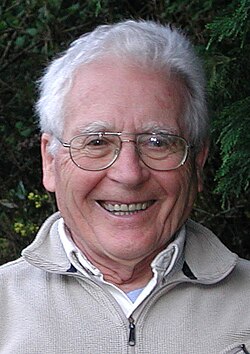James Lovelock Quote
Others consider us superior because of our cultured ways and intellectual tendencies; our technology lets us drive cars, use word processors and travel great distances by air. Some of us live in air-conditioned houses and we are entertained by the media. We think that we are more intelligent than stone-agers, yet how many modern humans could live successfully in caves, or would know how to light wood fires for cooking, or make clothes and shoes from animal skins or bows and arrows good enough to keep their families fed?
James Lovelock
Others consider us superior because of our cultured ways and intellectual tendencies; our technology lets us drive cars, use word processors and travel great distances by air. Some of us live in air-conditioned houses and we are entertained by the media. We think that we are more intelligent than stone-agers, yet how many modern humans could live successfully in caves, or would know how to light wood fires for cooking, or make clothes and shoes from animal skins or bows and arrows good enough to keep their families fed?
Related Quotes
She was a gypsy, as soon as you unravelled the many layers to her wild spirit she was on her next quest to discover her magic. She was relentless like that, the woman didn't need no body but an open r...
Nikki Rowe
Tags:
adventure, artist, authentic, balance, brave heart, courage, empowering women, free spirit, freedom, growth
People lack morals, good moral character is important in every aspect of your life. Honesty and Integrity opens the door. Your character allows others to see you for who you truly are. Make your first...
Amaka Imani Nkosazana
Tags:
abundance, adventure, aspects, believe, character, complete, completeness, difference, differences, friendship
About James Lovelock
James Ephraim Lovelock (26 July 1919 – 26 July 2022) was an English independent scientist, environmentalist and futurist. He is best known for proposing the Gaia hypothesis, which postulates that the Earth functions as a self-regulating system.
With a PhD in the chemistry of disinfection, Lovelock began his career performing cryopreservation experiments on rodents, including successfully thawing and reviving frozen specimens. His methods were influential in the theories of cryonics (the cryopreservation of humans). He invented the electron capture detector and, using it, became the first to detect the widespread presence of chlorofluorocarbons in the atmosphere. While designing scientific instruments for NASA, he developed the Gaia hypothesis.
In the 2000s, he proposed a method of climate engineering to restore carbon dioxide–consuming algae. He was an outspoken member of Environmentalists for Nuclear Energy, asserting that fossil fuel interests have been behind opposition to nuclear energy, citing the effects of carbon dioxide as being harmful to the environment and warning of global warming due to the greenhouse effect. He wrote several environmental science books based upon the Gaia hypothesis from the late 1970s.
He also worked for MI5, the British security service, for decades. Bryan Appleyard, writing in The Sunday Times, described him as "basically Q in the James Bond films".
With a PhD in the chemistry of disinfection, Lovelock began his career performing cryopreservation experiments on rodents, including successfully thawing and reviving frozen specimens. His methods were influential in the theories of cryonics (the cryopreservation of humans). He invented the electron capture detector and, using it, became the first to detect the widespread presence of chlorofluorocarbons in the atmosphere. While designing scientific instruments for NASA, he developed the Gaia hypothesis.
In the 2000s, he proposed a method of climate engineering to restore carbon dioxide–consuming algae. He was an outspoken member of Environmentalists for Nuclear Energy, asserting that fossil fuel interests have been behind opposition to nuclear energy, citing the effects of carbon dioxide as being harmful to the environment and warning of global warming due to the greenhouse effect. He wrote several environmental science books based upon the Gaia hypothesis from the late 1970s.
He also worked for MI5, the British security service, for decades. Bryan Appleyard, writing in The Sunday Times, described him as "basically Q in the James Bond films".
